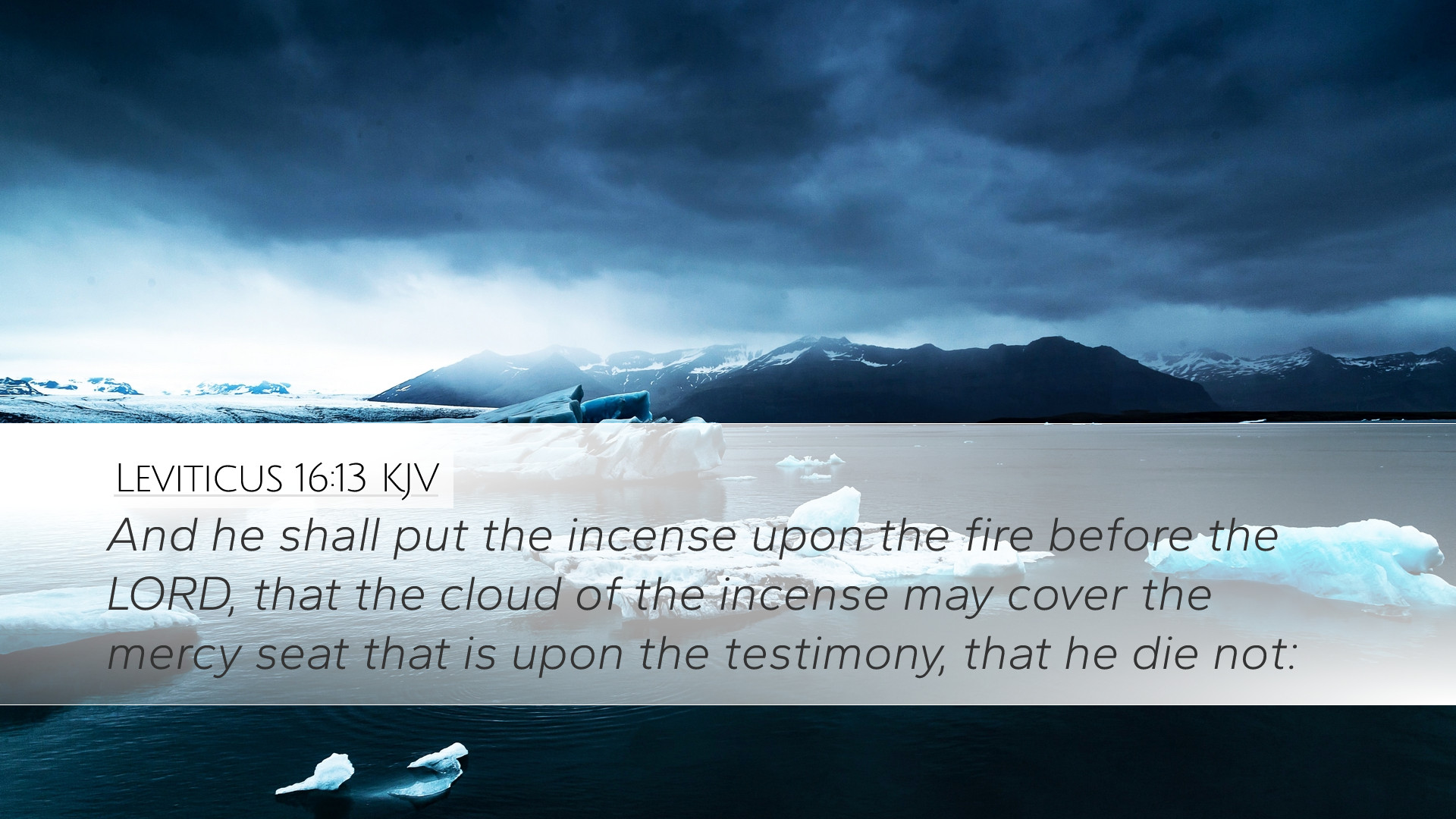Commentary on Leviticus 16:13
Verse Reference: Leviticus 16:13 - "And he shall put the incense upon the fire before the LORD, that the cloud of the incense may cover the mercy seat that is upon the testimony, that he die not."
Contextual Background
The Book of Leviticus is a critical component of Mosaic Law, detailing the holiness required of the Israelites and the sacrificial system to atone for sin. Chapter 16 describes the Day of Atonement, Yom Kippur, which was a solemn, yearly event emphasizing purification and reconciliation between God and His people. The practices described here reveal significant theological meanings regarding sin, atonement, and divine presence.
Insights from Public Domain Commentaries
From Matthew Henry
Matthew Henry emphasizes the significance of the incense used in this verse. The incense represents prayer, which rises before God, symbolizing the people’s petitions for mercy and forgiveness. Henry notes that the cloud of incense covering the mercy seat illustrates God's protective grace. This act signifies that the high priest, approaching the sacred space, does so with the necessary reverence and preparation, lest he face immediate death due to the overwhelming holiness of God.
From Albert Barnes
Albert Barnes highlights the procedural aspect of the high priest's actions. He points out that the incense must be placed on the fire in a specific manner which not only signifies the acceptance of the sacrifice by God but also creates a barrier between the high priest and the tremendous holiness of God, represented by the mercy seat. Barnes elaborates that this cloud serves as a form of divine protection, ensuring that the priest does not die when entering into the presence of God. This underscores the seriousness with which one must approach God, recognizing His holiness and our human frailty.
From Adam Clarke
Adam Clarke discusses the symbolism of the mercy seat and the incense cloud in the context of divine presence. He interprets the mercy seat as the location where God’s presence dwelled among the Israelites. Clarke notes that the ritual serves as a foreshadowing of Christ's ultimate sacrifice and intercession for humanity. The high priest’s actions in covering the mercy seat with incense depict the grace that would ultimately come through Jesus, who intercedes for His people. Clarke’s insights help readers to see the continuity between the Old Testament sacrificial system and New Testament grace.
Theological Implications
Leviticus 16:13 provides profound insights into the nature of God's holiness and His requirement for atonement:
- Divine Holiness: God’s presence is not to be approached lightly. The warnings and rituals highlight the necessity for purification and reverence in worship.
- Atonement and Intercession: The act performed by the high priest is integral to understanding the need for atonement in the Old Testament, which points to the ultimate sacrifice of Christ in the New Testament.
- Symbolism of Incense: The rising incense represents prayer and supplication, indicating that communication with God must be underpinned by humility and reverence.
- Mercy and Judgment: The mercy seat signifies God's mercy amidst judgment—a place where God’s grace covers the sin of humanity.
Application for Pastors and Theologians
This verse can be applied to contemporary Christian ministry as it emphasizes the importance of preparing one’s heart before approaching God. Pastors might use this commentary to teach congregations about the seriousness of sin and the need for authentic repentance. Furthermore, it serves as a reminder that Christ’s sacrifice has fully met the requirements of atonement, providing a direct line of communication to God through prayer.
Conclusion
Leviticus 16:13 reveals critical truths about God’s character and the nature of atonement. Understanding the depth of this passage enriches our grasp of both Old and New Testament theology. By combining insights from esteemed commentators like Matthew Henry, Albert Barnes, and Adam Clarke, we acknowledge the layered meanings within this text, nurturing a deeper appreciation for God’s holiness, mercy, and the grace that flows from His presence.


